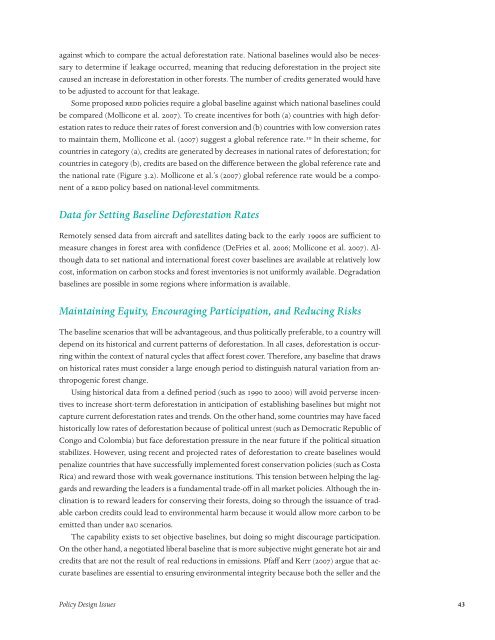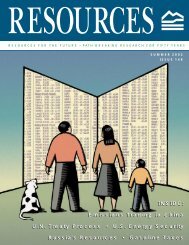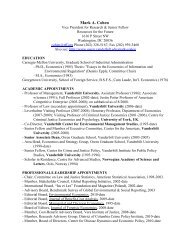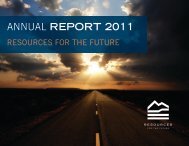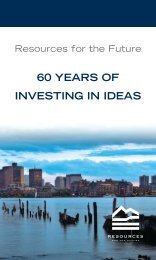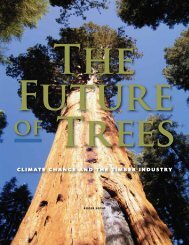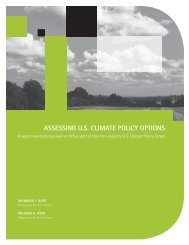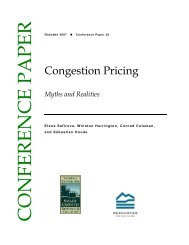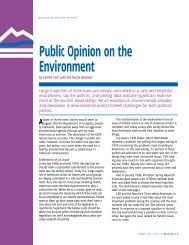Policies to Reduce Emissions from Deforestation and Degradation ...
Policies to Reduce Emissions from Deforestation and Degradation ...
Policies to Reduce Emissions from Deforestation and Degradation ...
Create successful ePaper yourself
Turn your PDF publications into a flip-book with our unique Google optimized e-Paper software.
against which <strong>to</strong> compare the actual deforestation rate. National baselines would also be necessary<br />
<strong>to</strong> determine if leakage occurred, meaning that reducing deforestation in the project site<br />
caused an increase in deforestation in other forests. The number of credits generated would have<br />
<strong>to</strong> be adjusted <strong>to</strong> account for that leakage.<br />
Some proposed REDD policies require a global baseline against which national baselines could<br />
be compared (Mollicone et al. 2007). To create incentives for both (a) countries with high deforestation<br />
rates <strong>to</strong> reduce their rates of forest conversion <strong>and</strong> (b) countries with low conversion rates<br />
<strong>to</strong> maintain them, Mollicone et al. (2007) suggest a global reference rate. 10 In their scheme, for<br />
countries in category (a), credits are generated by decreases in national rates of deforestation; for<br />
countries in category (b), credits are based on the difference between the global reference rate <strong>and</strong><br />
the national rate (Figure 3.2). Mollicone et al.’s (2007) global reference rate would be a component<br />
of a REDD policy based on national-level commitments.<br />
Data for Setting Baseline <strong>Deforestation</strong> Rates<br />
Remotely sensed data <strong>from</strong> aircraft <strong>and</strong> satellites dating back <strong>to</strong> the early 1990s are sufficient <strong>to</strong><br />
measure changes in forest area with confidence (DeFries et al. 2006; Mollicone et al. 2007). Although<br />
data <strong>to</strong> set national <strong>and</strong> international forest cover baselines are available at relatively low<br />
cost, information on carbon s<strong>to</strong>cks <strong>and</strong> forest inven<strong>to</strong>ries is not uniformly available. <strong>Degradation</strong><br />
baselines are possible in some regions where information is available.<br />
Maintaining Equity, Encouraging Participation, <strong>and</strong> Reducing Risks<br />
The baseline scenarios that will be advantageous, <strong>and</strong> thus politically preferable, <strong>to</strong> a country will<br />
depend on its his<strong>to</strong>rical <strong>and</strong> current patterns of deforestation. In all cases, deforestation is occurring<br />
within the context of natural cycles that affect forest cover. Therefore, any baseline that draws<br />
on his<strong>to</strong>rical rates must consider a large enough period <strong>to</strong> distinguish natural variation <strong>from</strong> anthropogenic<br />
forest change.<br />
Using his<strong>to</strong>rical data <strong>from</strong> a defined period (such as 1990 <strong>to</strong> 2000) will avoid perverse incentives<br />
<strong>to</strong> increase short-term deforestation in anticipation of establishing baselines but might not<br />
capture current deforestation rates <strong>and</strong> trends. On the other h<strong>and</strong>, some countries may have faced<br />
his<strong>to</strong>rically low rates of deforestation because of political unrest (such as Democratic Republic of<br />
Congo <strong>and</strong> Colombia) but face deforestation pressure in the near future if the political situation<br />
stabilizes. However, using recent <strong>and</strong> projected rates of deforestation <strong>to</strong> create baselines would<br />
penalize countries that have successfully implemented forest conservation policies (such as Costa<br />
Rica) <strong>and</strong> reward those with weak governance institutions. This tension between helping the laggards<br />
<strong>and</strong> rewarding the leaders is a fundamental trade-off in all market policies. Although the inclination<br />
is <strong>to</strong> reward leaders for conserving their forests, doing so through the issuance of tradable<br />
carbon credits could lead <strong>to</strong> environmental harm because it would allow more carbon <strong>to</strong> be<br />
emitted than under BAU scenarios.<br />
The capability exists <strong>to</strong> set objective baselines, but doing so might discourage participation.<br />
On the other h<strong>and</strong>, a negotiated liberal baseline that is more subjective might generate hot air <strong>and</strong><br />
credits that are not the result of real reductions in emissions. Pfaff <strong>and</strong> Kerr (2007) argue that accurate<br />
baselines are essential <strong>to</strong> ensuring environmental integrity because both the seller <strong>and</strong> the<br />
Policy Design Issues 43


